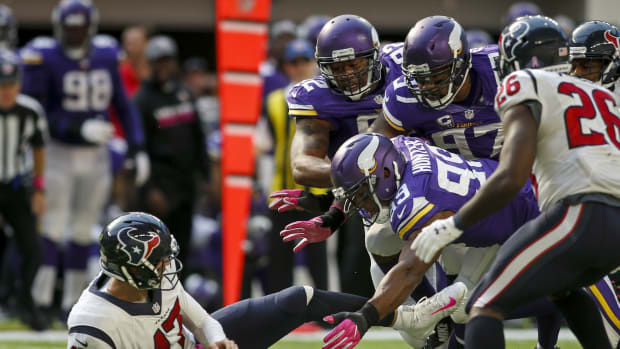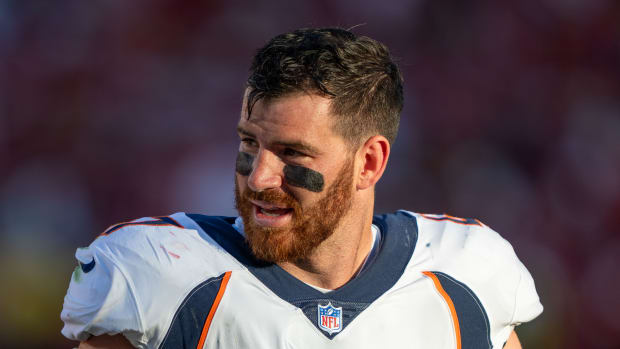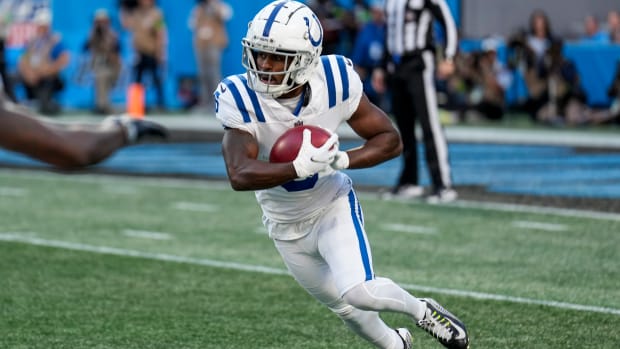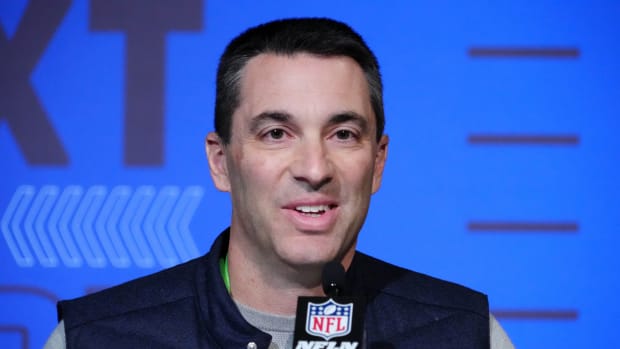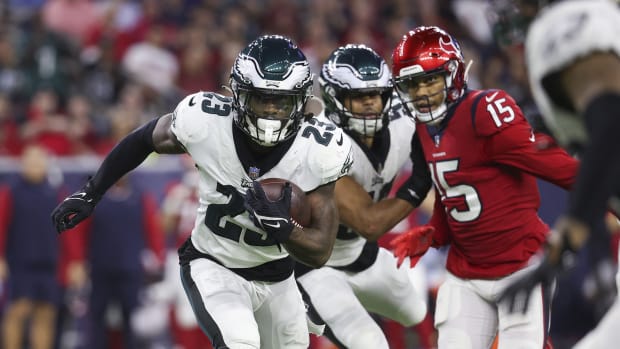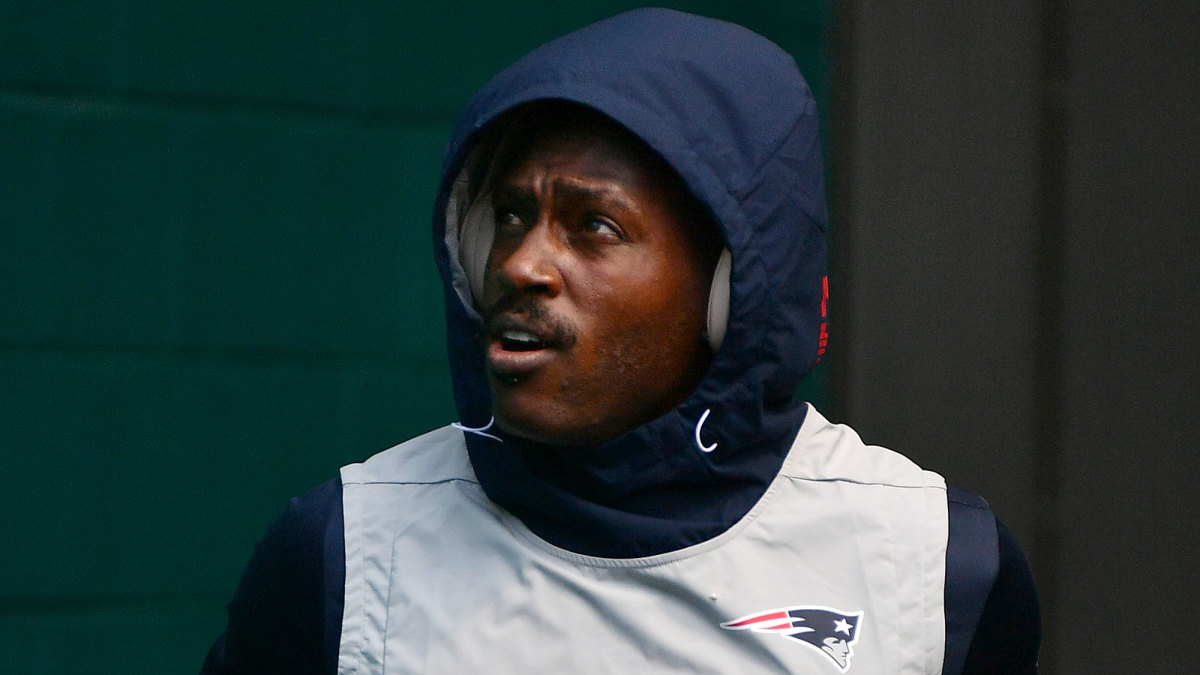
Would the NFL Even Allow Antonio Brown to Play for the Saints?
The New Orleans Saints have called an audible in the unusual situation involving free-agent wide receiver Antonio Brown.
The team worked out the 31-year-old, four-time All Pro unexpectedly on Friday. A workout also doesn’t mean that a signing is forthcoming, only that a team is evaluating a particular player. Still, Brown’s workout is newsworthy because no team had previously extended such a request since the four-time All Pro was cut from the Patriots, and no team was expected to. ESPN’s Adam Schefter reported that the team is merely doing due diligence on available wide receivers.
The Saints, who are 12-3 and in first place in the NFC South, already employ one of the game’s best wide receivers in Michael Thomas—so far this season, he has an NFL-record 145 catches for 1,688 yards with one game to play. Brown, who caught 104 passes for the Steelers in 2018, would give QB Drew Brees another elite receiver to throw to during the upcoming NFL playoffs.
However it’s no secret that teams are scared away by Brown’s thorny status with the NFL, and his often disruptive and insulting use of social media.
Brown’s workplace troubles and the (unproven) allegations against him
The months of July, August and September were disastrous for Brown’s NFL career. Brown drew the ire of both the Oakland Raiders, who traded a third- and fifth-round draft pick for him in the offseason, and later the Patriots, who picked him up after Oakland cut him. With the Raiders, Brown suffered frostbite on his feet in a cryotherapy incident, missed practices without permission, confronted general manager Mike Maycock, recorded and posted a private phone conversation with head coach Jon Gruden, and filed two grievances in an attempt to wear a helmet that his own union had deemed unsafe. This all occurred over an extraordinarily tumultuous two-month period.
Brown’s time with the Patriots wasn’t quite as chaotic, though it lasted only 11 days. While with New England, Brown allegedly sent threatening messages to a woman, and creepily included photos of that woman’s children in one message. After the Patriots cut him on Sept. 20, Brown filed a salary grievance against the team.
Most significantly, Britney Taylor, who had previously trained Brown, sued him in September for alleged sexual assault and other misconduct. Last month, Brown countersued Taylor for defamation and tortious interference. Taylor has met with NFL investigators but has not, as far as known, provided sworn testimony about her allegations. Brown has also met with NFL investigators and denies Taylor’s claims.
Other women have also accused Brown of wrongdoing. He allegedly partook in threatening, harassing and, at times, violent acts. Those allegations were uncovered by former Sports Illustrated writer Robert Klemko, who obtained hostile and inflammatory texts allegedly sent by Brown to one of his accusers.
Brown’s recent troubles extend to acrimonious relationships with workers and employers. He has been accused of not paying people who perform professional services on his behalf.
He has also used social media to mock, and then apologize to, Patriots owner Robert Kraft. Brown has ridiculed other people on social media, including Steelers quarterback Ben Roethlisberger. Brown has also accused the NFL of racism and implied that he is being boycotted.
As of this writing, Brown, who has been a free agent since New England released him on Sept. 20, is not subject to any form of NFL discipline.
Brown could argue the NFL has effectively suspended him
Despite it all, Brown has not been charged with a crime, let alone convicted of one. Also, accusations that Brown committed violent acts have not been made while under oath. This means accusers and other witnesses aren’t at risk of committing perjury if they knowingly lie about Brown. That’s not to say the accusations are false or that Brown has behaved ethically or lawfully. Accusations, though, are not established facts until they are actually proven.
It’s also telling that the NFL hasn’t disciplined Brown. The league isn’t obligated to punish him within a certain period of weeks or months, but Brown and the NFLPA can rightfully ask why the league hasn’t completed its review. Taylor’s claims have been known for at least three and a half months. The league has also interviewed both Taylor and Brown, and reviewed texts and other evidence. It’s not clear what else needs to be determined in order for the NFL to make a decision.
The league has also enjoyed the clear power and discretion to punish Brown. Under Article 46 of the collective bargaining agreement, a first-time offense for domestic violence carries a baseline six game suspension. Other types of misconduct can carry suspensions of lengths as determined by commissioner Roger Goodell. If Goodell concluded that Brown engaged in domestic violence or other forms of punishable misconduct, he could have already suspended Brown. The suspension would begin to run when and if Brown returned to the league. The lack of suspension suggests that Goodell isn’t certain that Brown engaged in wrongdoing.
Complicating matters are reports that should any team sign Brown, Goodell would immediately place him on the paid leave exempt list. This is an unappealing prospect for any team, and arguably acts as a de facto—and indefinite—suspension of Brown. While Brown is on the exempt list, his team would have to pay him but he would be ineligible to play or practice for his new team. He could also remain on the list indefinitely.
The standard for placement on the exempt list is extremely low. Goodell merely needs to find that, pursuant to a league investigation, a player “may have”—not must have, only may have—engaged in any act that could be considered a crime of violence. Threatened violence, including an intemperately worded text or Instagram post that makes a physical threat, would count. There are also no procedural requirements related to a league investigation. Goodell essentially has total discretion.
Saints may have forced the NFL to act, and Brown and NFLPA could file grievances
The NFL might have assumed that they could punt on the Brown situation until the offseason. Although several teams have reportedly kicked the tires on Brown, none had brought him in for a workout. The fact that the 12-3 Patriots, whose wide receivers have struggled with inconsistency and injuries, weren’t interested in bringing Brown back for the playoffs seemed to signal that he would remain away from the NFL until next year.
The Saints and head coach Sean Payton—whom Goodell suspended for the entire 2012 season due to Payton’s alleged role in Bountygate—abruptly altered the timeline. If the Saints sign Brown and if Goodell then immediately places Brown on the exempt list or suspends him, it’s possible Brown and the NFLPA could file a grievance. Unfortunately for Brown and the NFLPA, such a grievance would go to Goodell or a designate of Goodell’s choosing.
Still, the NFLPA might welcome the prospect of contesting Goodell’s authority. Even if the rules permit Goodell to exempt or suspend Brown, forcing the NFL to explain the precise reasons for punishing Brown—and the timing for issuing that punishment—would put the league on the defensive.
As mentioned above, Brown could argue that the timing is unfair and that he has already been effectively suspended by the league. Multiple respected NFL journalists have written and reported that the league would exempt Brown if any team signs him. It’s obvious those journalists aren’t making up the same report—someone, presumably with ties to the NFL, is feeding it to them. Since no team wants to sign and pay a player only to have him immediately become unavailable, Brown can insist he’s been de facto suspended since the Patriots cut him in September.
Brown and the NFLPA could even explore the possibility of bringing a collusion grievance against the league. Under Article 17 of the CBA, collusion can occur when the league and at least one team conspire to deprive a player of the collectively bargained right to sign with a team. Collusion attracted significant attention when Colin Kaepernick and Eric Reid pursued collusion grievances against the NFL and succeed in procuring a multi-million-dollar settlement.
If the NFL has leaked to media information intended to dissuade teams from signing Brown, perhaps Brown and the NFLPA could show that the league has more directly discouraged teams from signing him. A collusion grievance would be heard by a neutral arbitrator, not Goodell. To prevail in a collusion grievance, Brown would need to prove a by a clear preponderance of the evidence that collusion occurred and that it caused him economic harm.
NFL could counter any grievances filed by Brown and NFLPA
Other than applying public pressure on the NFL, Brown and the NFLPA filing grievances would likely lead to failed outcomes. Goodell would have discretion to hear any conduct grievances. While a collusion grievance wouldn’t fall under Goodell’s authority, proof of collusion requires much more than conjecture or theory—it demands actual evidence.
Also, the NFL would be armed with a variety of counter arguments. The league could credibly maintain that it has followed all collectively bargained procedural requirements for conduct matters. Any unfairness suffered by Brown arguably stems from the NFLPA’s failure to negotiate safeguards for players who are accused of misconduct (Brown could talk to Brady about that).
Goodell also doesn’t have a need to place Brown on the exempt list until he signs with a team. The list is designed to separate a player accused of wrongdoing from his team while the league conducts an investigation. Since Brown isn’t on a team, placement of Brown on the exempt list arguably doesn’t make any sense. That would change if he signed with a team.
The league can further contend that Brown’s absence from the NFL isn’t the result of a vast conspiracy. It instead, the NFL would maintain, reflects each NFL team deeming Brown too much of a risk. He’s clearly a loose cannon on social media, he doesn’t always follow team rules and at times he doesn’t seem to respect authority. Teams generally don’t want players who cause distractions.
Lastly, the Saints may have just done the NFL—and its attorneys—a favor. If the NFL didn’t want teams to sign Brown, then the Saints didn’t get, or don’t care about, the message—or, more likely, there is no message. The team’s interest in signing Brown would undermine a collusion grievance since it shows the team is acting in pursuit of its own best interests and isn’t following any league edict.
Michael McCann is SI’s Legal Analyst. He is also an attorney and the Director of the Sports and Entertainment Law Institute at the University of New Hampshire Franklin Pierce School of Law.
Question or comment? Email us at talkback@themmqb.com.

































